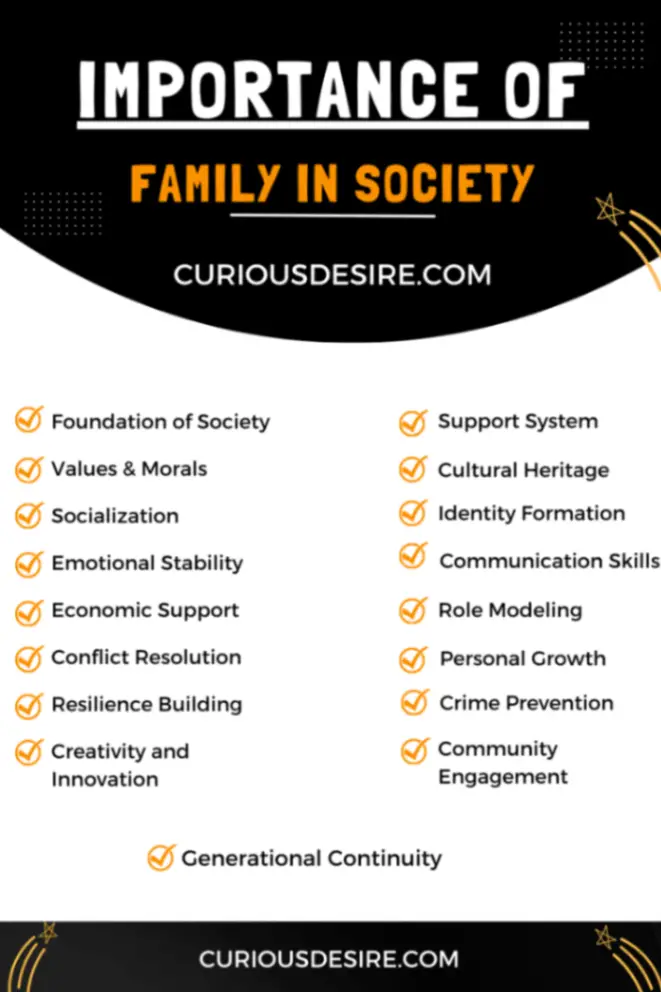Family. It’s a word that conjures up images of warm gatherings, shared traditions, and unconditional love.
But beyond the heartwarming nostalgia, families play a vital role in society that extends far beyond the dinner table.
It plays a crucial role in shaping our values, beliefs, and relationships.
The family unit provides love, support, and guidance, creating a safe and nurturing environment where you can grow and thrive.
In this blog, we will explore the significance of family in society and why it remains an essential institution in our lives.
5 most effective reasons for the importance of family in society:
- Emotional Support System
- Morals and Values
- Cultural Heritage
- Socialization
- Role Modeling

1. Foundation of Society
The family serves as the cornerstone and foundation of society.
It is within the family unit that you first learn the essential skills, values, and norms necessary for functioning within a community.
From infancy, children observe and absorb behaviors, attitudes, and social patterns demonstrated by their family members. These early experiences shape their understanding of societal roles, responsibilities, and expectations.
Families provide the framework for socialization, teaching children how to communicate, cooperate, and negotiate with others.
Without strong family foundations, societies would lack the cohesive bonds necessary for cooperation, mutual support, and progress.
2. Emotional Support System
One of the primary functions of the family in society is to provide emotional support and nurture the well-being of its members.
Within the familial embrace, you find acceptance, empathy, and unconditional love, forming the bedrock of your emotional resilience.
Family members offer a safe space where you can express your feelings, share your joys and sorrows, and seek comfort during times of distress.
Through empathetic listening, affectionate gestures, and practical assistance, families strengthen each other’s mental and emotional health.
3. Values and Morals
Families play a pivotal role in the transmission of values, morals, and ethical principles that guide behavior and decision-making within society.
From an early age, children learn fundamental concepts of right and wrong, fairness, honesty, and respect through the examples set by their family members.
By instilling a strong moral compass and a sense of social responsibility, families contribute to the development of principled citizens who uphold ethical standards and contribute positively to their communities.
The values imparted within the family unit serve as the building blocks of a just and compassionate society, fostering empathy, cooperation, and mutual respect among its members.
4. Interpersonal Relationships
Families are the crucible where you learn to navigate interpersonal relationships, fostering essential skills in communication, empathy, and conflict resolution.
These interpersonal skills cultivated within the family unit extend beyond familial relationships to encompass interactions with friends, colleagues, and members of the broader community.
Strong family ties provide a supportive framework for building healthy relationships based on trust, respect, and mutual understanding.
By promoting harmonious interpersonal dynamics, families contribute to the cultivation of peaceful and inclusive societies characterized by cooperation and goodwill.
5. Cultural Heritage
Families are the custodians of cultural heritage, preserving traditions, customs, languages, and rituals that define a community’s identity.
Within the familial context, you are immersed in cultural practices passed down through generations, from celebrating holidays and festivals to participating in religious ceremonies and observing familial rituals.
Through these shared experiences, families transmit cultural values, beliefs, and norms, cultivating a sense of belonging and continuity with the past.
Cultural heritage serves as a source of pride and identity, strengthening bonds within families and connecting them to broader ethnic, religious, or national communities.
By preserving and perpetuating cultural traditions, families enrich the diversity of society and contribute to its cultural vibrancy and resilience.
6. Education and Development
Families play a crucial role in the education and development of individuals, laying the foundation for lifelong learning and personal growth.
From infancy, children learn essential skills through interactions with family members, such as
- Language acquisition
- Problem-solving
- Social interaction
Parents serve as primary educators, nurturing curiosity, creativity, and critical thinking through storytelling, play, and educational activities.
Beyond academic learning, families impart practical knowledge and life skills necessary for navigating the complexities of adulthood, such as financial literacy, time management, and household management.
By fostering a supportive learning environment, families empower you to fulfill your potential, pursue your aspirations, and contribute meaningfully to society through your talents and expertise.
7. Socialization
Family serves as the primary agent of socialization, shaping our understanding of societal norms, values, and roles.
From an early age, children learn social skills, etiquette, and cultural practices through observation, imitation, and guidance from family members.
Through daily interactions and shared experiences, families provide opportunities for children to develop empathy, cooperation, and a sense of responsibility toward others.
Socialization within the family extends beyond the nuclear unit to encompass extended family networks, kinship groups, and community affiliations.
These social bonds foster a sense of belonging and connectedness, instilling in you a commitment to the welfare of others and a willingness to participate actively in community life.

8. Identity Formation
Family relationships and dynamics play a central role in shaping your sense of self and identity.
Through interactions with family members, you internalize values, beliefs, and cultural practices that contribute to your self-concept and worldview.
Family narratives, stories, and histories provide you with a sense of continuity and belonging, connecting you to your ancestral roots and familial heritage.
Moreover, family relationships serve as mirrors reflecting your strengths, weaknesses, and unique attributes, shaping your self-esteem and confidence.
9. Emotional Stability
Family provides a fundamental source of emotional stability.
It serves as a support system where members can find comfort, love, and understanding during challenging times.
A strong family unit can help you develop resilience, cope with stress, and navigate life’s ups and downs more effectively.
The bonds formed within a family can offer a sense of security and belonging that contributes to emotional well-being.
10. Communication Skills
Effective communication is a key component of successful relationships and interactions within society.
Families play a vital role in shaping your communication skills from a young age.
Through daily interactions with family members, you learn how to express yourself, listen actively, resolve conflicts, and collaborate effectively.
These communication skills acquired within the family unit are crucial for building healthy relationships outside the family, be it in school, the workplace, or the community.
11. Health and Well-being
Family significantly influences the health and well-being of its members.
Families can promote healthy lifestyle choices, encourage positive habits, and provide emotional support during times of illness or distress.
Strong family relationships have been linked to lower levels of stress, reduced risk of mental health issues, and better overall physical health.
Moreover, the emotional support and care provided by family members can contribute to a sense of purpose and fulfillment, which are essential for your well-being.
12. Economic Support
Families often serve as a primary source of economic support for their members.
From providing necessities such as food, shelter, and clothing to contributing to education and career opportunities, families play a crucial role in ensuring the financial stability of their members.
Economic support within families can also extend to intergenerational wealth transfer, where resources are passed down to future generations, creating a sense of security and continuity.
According to research, the provision of economic support to families is a crucial preventive approach that can alleviate stress and decrease the occurrence of abuse and neglect.
Strong family relationships contribute not only to the well-being of individuals but also to the fabric of society as a whole, forming the foundation for social stability and cohesion.
13. Role Modeling
Family members serve as role models for one another, exemplifying behaviors, attitudes, and values that influence your development and behavior.
Children observe and imitate the actions of their parents, siblings, and other family members, internalizing social norms, and expectations through these interactions.
Positive role modeling within the family fosters the development of desirable traits such as kindness, honesty, perseverance, and responsibility.
By witnessing positive role modeling within the family, you learn valuable life lessons and acquire skills that enable you to navigate relationships, pursue goals, and contribute positively to society.
14. Generational Continuity
Families provide a continuum of experience and knowledge across generations, ensuring the preservation and transmission of familial values, traditions, and cultural heritage.
Elders within the family share their wisdom, life experiences, and stories with younger generations, bridging the gap between past and present.
Generational continuity within families fosters a sense of connection to one’s roots and ancestral heritage, instilling a shared identity and collective memory that binds family members together.
By preserving and passing down familial traditions and values, families contribute to the preservation of cultural heritage and promote a sense of belonging and continuity within society.
Generational continuity ensures that each new generation builds upon the legacy of those who came before, enriching the fabric of society with their unique contributions and perspectives.
15. Conflict Resolution
Conflict is inevitable within any social group, but families serve as training grounds for learning constructive conflict-resolution skills.
From minor disagreements to more significant disputes, families provide opportunities for you to practice communication, negotiation, and compromise in resolving conflicts.
The ability to resolve conflicts peacefully and respectfully learned within the family extends beyond familial relationships to other social contexts, such as school, work, and community settings.
By promoting effective conflict resolution skills, families contribute to the creation of harmonious and cooperative societies where differences are acknowledged and resolved constructively.
16. Community Engagement
Families serve as the building blocks of community engagement, providing a foundation for social connections and collective action.
Through involvement in community organizations, religious institutions, and volunteer activities, families strengthen ties with their broader social network and contribute to the well-being of their communities.
By working together toward common goals, families enhance social cohesion and promote a sense of belonging and inclusion for all members of the community.
Community engagement within families instills values of civic responsibility, empathy, and altruism in you, encouraging you to make meaningful contributions to the betterment of society.
By nurturing a spirit of cooperation and collaboration, families play a vital role in creating vibrant, resilient, and thriving communities where everyone has the opportunity to flourish.
17. Personal Growth
Families play a pivotal role in personal development and growth.
From early childhood, family members serve as role models, teachers, and mentors, imparting values, beliefs, and skills necessary for steering life’s challenges.
Through interactions within the family, you learn essential social and communication skills, empathy, and resilience.
Furthermore, family support facilitates educational and career pursuits, enabling you to reach your full potential and contribute meaningfully to society.

18. Resilience Building
Families serve as a critical platform for resilience building, equipping you with the tools to cope with adversity and bounce back from setbacks.
Through experiences within the family, you learn problem-solving skills, adaptability, and perseverance.
Strong familial ties provide a safety net during turbulent times, enabling family members to weather crises, such as natural disasters, economic downturns, or health emergencies, more effectively.
Resilient families contribute to the overall stability and cohesion of society, mitigating the adverse effects of stressors on individuals and communities.
19. Crime Prevention
Family cohesion and support play a significant role in crime prevention.
- Supportive Environment: Positive familial relationships and strong bonds reduce the likelihood of individuals seeking validation or belonging through criminal activities.
- Socialization and Guidance: Families serve as primary agents of socialization, teaching children appropriate behavior and attitudes towards authority and societal norms.
- Conflict Resolution Skills: Learning to resolve conflicts within the family promotes non-violent communication and problem-solving, reducing the tendency for violent or criminal behavior.
- Supervision and Monitoring: Supportive families provide guidance, supervision, and accountability, discouraging involvement in criminal activities through active involvement in their members’ lives.
20. Creativity and Innovation
Family environments that encourage creativity and innovation contribute to societal progress.
When family members are encouraged to express themselves freely, explore their interests, and pursue their passions, they are more likely to develop innovative ideas and solutions.
Innovators often need to take risks and step outside their comfort zones to explore new ideas. Supportive families provide a safety net for you to take calculated risks, knowing you have a supportive environment to fall back on if things don’t go as planned.
By nurturing a culture of creativity within the family unit, society benefits from the diverse perspectives, ideas, and solutions generated by its members.
Conclusion
The family remains a vital institution in society, playing a multifaceted role in shaping individuals, communities, and the world at large.
Its impact is profound and far-reaching, influencing our personal development, social interactions, cultural heritage, and economic well-being.
As we navigate the complexities of modern life, let us cherish and nurture our families, recognizing them as the heartbeat of society that sustains us and shapes our collective future.